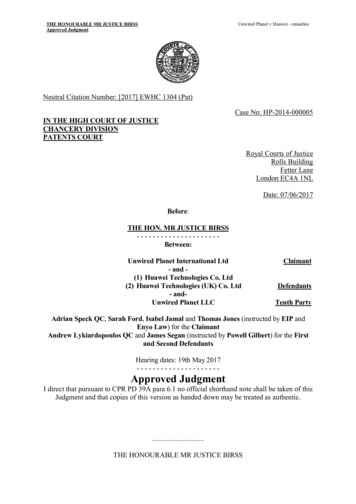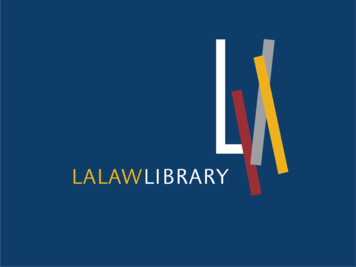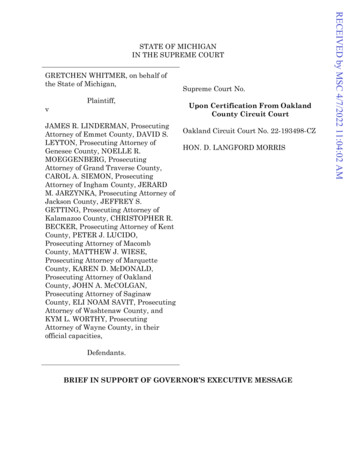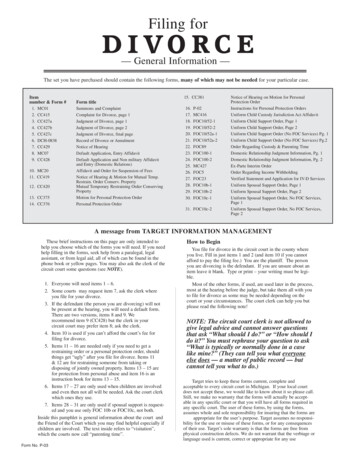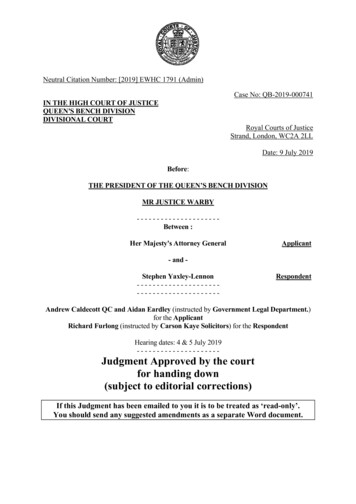
Transcription
Unwired Planet v Huawei: FRAND - publicTH E HO NOURABLE MR JUSTICE BIRSSApprove d JudgmentNeutral Citation Number: [2017] EWHC 711 (Pat)Case No: HP-2014-000005IN THE HIGH COURT OF JUSTICECHANCERY DIVISIONPATENTS COURTRoyal Courts of JusticeRolls BuildingFetter LaneLondon EC4A 1NLDate: 05/04/2017Before :THE HON. MR JUSTICE BIRSS--------------------Between :Unwire d Planet International Ltd- and (1) Huawei Technologies Co. Ltd(2) Huawei Technologies (UK) Co. Ltd- andUnwire d Planet LLCClaimantDefendantsTenth PartyAdrian Speck QC, Sarah Ford, Isabel Jamal and Thomas Jones (instructed by EIP andEnyo Law) for the ClaimantAndre w Lykiardopolous QC and James Segan (instructed by Powell Gilbe rt) for the Firstand Second DefendantsHearing dates: 24th, 25th, 31st October, 1st -4th, 9th - 11th, 14th, 15th, 21st - 24thNovember, 5th - 8th December 2016---------------------Approved JudgmentI direct that pursuant to CPR PD 39A para 6.1 no official shorthand note shall be taken of thisJudgment and that copies of this version as handed down may be treated as authentic.
Unwired Planet v Huawei: FRAND - publicTH E HO NOURABLE MR JUSTICE BIRSSApprove d Judgment.THE HONOURABLE MR JUSTICE BIRSS
TH E HO NOURABLE MR JUSTICE BIRSSApprove d JudgmentUnwired Planet v Huawei: FRAND - publicMr Justice Birss :Introduction, the issues, confidentiality, evidence and factual backgroundFRANDThe applicable principles(i) What is FRAND and what principles apply to it(ii) The history and purpose of FRAND(iii) Enforceability of the ETSI FRAND undertaking and French law(iv) Can there be more than one set of FRAND terms?(v) Can the court set a FRAND rate or other FRAND terms?(vi) How to assess what is FRAND(vii) A hard-edged non-discrimination aspect of FRAND(viii) Concepts used to derive a FRAND rate with telecoms standardsFRAND on the facts of this case(i) Relevant SEPs – shares and ratios(ii) The parties’ rival submissions on royalty rates(iii) The MNPA and HPA techniques(iv) Findings about the strength of Unwired Planet’s portfolio(v) The comparables in this casea. Unwired Planet – Lenovo 2014b. Unwired Planet – Samsung 2016c. Ericsson - Huawei 2016d. Ericsson - Samsung 2014e. Ericsson - Huawei 2009f-m. other licences(vi) Other indications relating to rates(vii) What is the benchmark FRAND rate for Unwired Planet?(viii) Impact of hard-edged non-discrimination on the FRAND rate(ix) Rates - conclusions(x) The other disputed termsa. What licence scope is FRAND – UK or worldwide?b. Should the court settle the FRAND rates in a worldwide licencec. FRAND rates in a worldwide licenced. Other terms in a worldwide licencee. The terms of a UK only portfolio licenceCOMPETITION LAW(i) Dominant position(ii) Abuse of dominancea. Premature litigation: Huawei v ZTEb. Unfair excessive pricingc. Bundling/ tying- in SEPs and non-SEPsREMEDIES(i) Should an injunction be granted(ii) Damages(iii) DeclarationsSummary of 27630671674756785792793796803805
TH E HO NOURABLE MR JUSTICE BIRSSApprove d JudgmentUnwired Planet v Huawei: FRAND - publicAnnex 1 – Unwired Planet’s declared SEPs by countryIntroduction1.Unwired Planet have a worldwide patent portfolio which includes numerous patentswhich are declared essential to various telecommunications standards (2G GSM, 3GUMTS, and 4G LTE). Most of the relevant portfolio was acquired from Ericsson.Unwired Planet’s business is licensing those patents to companies who make and selltelecommunications equipment such as mobile phones and infrastructure. This actionbegan in March 2014 when Unwired Planet sued Huawei, Samsung and Google forinfringement of six UK patents from their portfolio. Five were claimed to be SEPs(see below). Unwired Planet contended their patents were infringed and (so far asrelevant) essential.2.The dispute was managed to consist of a series of trials, docketed to me. First wouldbe five “technical” trials relating to the validity and infringement/essentiality of thesix patents (two patents are divisionals). These were called trials A to E and were torun from October 2015 to July 2016. The patent in trial A was patent EP (UK) 2 229744 which is for an invention concerning poll triggers, the patents in trial B weredivisionals EP (UK) 2 119 287 and EP (UK) 2 485 514 which are for an inventionrelated to self-configuring networks, the patent in trial C was EP (UK) 1 230 818which relates to inter-RAT handover, the patent in trial D was EP (UK) 1 105 991which related to Hadamard codes, and the patent in trial E was EP (UK) 0 989 712which relates to network messaging. The 712 patent was not said to be a SEP.3.After the five technical trials would be a non-technical trial in autumn 2016. The nontechnical trial was to address all the competition law issues as well as the FRANDissues (see below), injunctive relief (if any) and, by a later direction, damages for pastinfringements. Finally, and only if necessary, there might be a further trial to dealwith some outstanding questions including pass through licences.4.This judgment arises from the non-technical trial and relates to the patents which areor are said to be Standards Essential Patents or SEPs. Part of the process ofstandardisation involves holders of patents which are essential to an internat ionaltelecommunications standard declaring them as essential to the relevant standardsbody. In this case that body is the European Telecommunications Standards Institute(ETSI). The ETSI IPR Policy requires that a patentee declaring patents as essentia l toa standard commits to licensing those patents on FRAND terms. FRAND stands forFair Reasonable And Non-Discriminatory. The judgment mostly concerns FRAND.5.After proceedings began, in April 2014, Unwired Planet made an open offer to thedefendants to license its entire global portfolio (SEPs and non-SEPs). The defendantsdenied infringement/essentiality and contended the patents were invalid,counterclaiming for revocation. So, they said, no licence was needed. They alsocontended that Unwired Planet’s offer was not FRAND. In addition, Huawei andSamsung raised defences and counterclaims based on breaches of competition law.This involved both arguments about Art 101 of the Treaty on the Functioning of the
TH E HO NOURABLE MR JUSTICE BIRSSApprove d JudgmentUnwired Planet v Huawei: FRAND - publicEuropean Union (TFEU) relating to the Master Sale Agreement (MSA) wherebyUnwired Planet acquired patents from Ericsson and arguments about Art 102 TFEUconcerning abuse of dominant position. The allegation that the offer was not FRANDwas pleaded as a breach of competition law. These allegatio ns were the subject ofcounterclaims against other companies in what was then the Unwired Planet group(the ninth and tenth defendants) as well as against Ericsson, who were joined as theeleventh party to the proceedings. Various other defences were also raised. After theApril 2014 offer Unwired Planet made a further offer in July 2014. That offer relatedonly to Unwired Planet’s SEPs.That is also said not to be FRAND by thedefendants. The terms of these and other licensing offers are difficult to summarisebut at this stage it can be said that the SEP royalty rates in the July 2014 proposalswere global rates of 0.2% for 4G/- LTE and 0.1% for other standards (i.e.GSM/UMTS). The percentages related to average selling price (ASP) for mobiledevices and revenue for infrastructure. These offers and other of Unwired Planet’soffers also contained US dollar or sterling alternative figures which operated as a capif the royalty expressed as a share of ASP would be a higher sum. This is the last timeI will mention them. The caps did not play a significant part in this case.6.Sometimes in this case the terms 2G, 3G and 4G are used to refer to differentstandards and sometimes GSM, UMTS (or WCDMA) and LTE respectively. Theyare not the same but the distinction rarely matters. In this judgment I have tried to usethe terms which reflect the way the argument and evidence went in any given contextbut it is impossible to be consistent. A complication is multimode handsets. A4G/LTE handset will usually be able to work on earlier standards (2G/GSM and3G/UMTS). It is therefore “multimode”. There can be exceptions and so calling ahandset 4G or LTE can be ambiguous since it probably refers to a multimode devicebut might not. Again it is impossible to be consistent.7.In June 2015 as a result of directions from the court which are considered furtherbelow, each side made certain open offers of licensing terms. Unwired Planet’s June2015 proposals included offers of a worldwide SEP portfolio licence, a UK SEPportfolio licence (the UK portfolio consists of more patents than just the five SEPs insuit) and per-patent licences for any SEPs the licensee chose. The details do notmatter at this stage but one point to note is that the royalties claimed for per-patentlicences or a UK portfolio were higher than the global rate on offer. The rates allscaled by reference to the same global rate proposals as in 2014, i.e. a global rate of0.2% for LTE and 0.1% for GSM/UMTS.8.Huawei’s June 2015 proposal was for a per-patent licence limited to the UK SEPs insuit. The rates for all five SEPs together were 0.034% for LTE, 0.015% for UMTSand zero for GSM.9.In the summer of 2015 and before trial A, Google settled as regards the SEPs. Fromthen on they would only have played a role in the fifth technical trial (E) since thatrelated to the implementation patent. By about April 2016 three technical trials hadbeen completed and the parties agreed to postpone any further technical trialsindefinitely. By that stage Unwired Planet had won two and lost one of the technicaltrials. Two of Unwired Planet’s patents had been found to contain claims which werevalid and were essential to the relevant standards while the other two patents were
TH E HO NOURABLE MR JUSTICE BIRSSApprove d JudgmentUnwired Planet v Huawei: FRAND - publicheld invalid. The results of all three technical trials are under appeal to the Court ofAppeal. Also in about April 2016, the claimant company and the tenth party(Unwired Planet LLC) were acquired by PanOptis, a group ultimately held byPanOptis Equity Holdings LLC. The ninth party, Unwired Planet Inc., was notacquired and changed its name to Great Elm Capital Group Inc.10.In the summer of 2016 Samsung settled with Unwired Planet and Ericsson. As aresult of the settlement, proceedings against Samsung ended and, with the court’sleave, Samsung’s competition law counterclaim was discontinued. This includeddiscontinuance against the ninth party. Huawei, also with leave, then discontinuedsignificant parts of their counterclaim, including all their counterclaims againstEricsson and the ninth and tenth parties. Pursuant to the settlement, certain terms inthe MSA, which Samsung and Huawei had contended were anti-competitive, wereremoved. An important term which was removed from the MSA was a provisionwhich at least arguably put a floor on the royalty rate which Unwired Planet couldoffer. This rate is called the Applicable Royalty Rate or ARR. As a result, the scopeof the non-technical trial narrowed considerably and the case was rescheduled to bedealt with in seven weeks of elapsed time.11.On 1st August 2016 each side made new offers. Unwired Planet’s offers were on thesame terms as before but with lower rates. Unwired Planet obviously felt able to offerlower rates at that stage at least in part because the royalty floor provisions in theMSA had been removed. The global SEP portfolio rate for 4G/LTE in this offer was0.13%. The corresponding rates for GSM /UMTS were 0.065%.12.For a UK SEP portfolio licence Unwired Planet’s August 2016 proposals are:13.14.i)for LTE: infrastructure 0.42%; mobile devices 0.55%;ii)for GSM/UMTS: infrastructure 0.21%; mobile devices 0.28%.Huawei’s 1 st August offer was on the same UK only per-patent basis as before. Therates proposed were:i)for LTE: infrastructure 0.036%; mobile devices 0.040%;ii)for UMTS: infrastructure 0.015%; mobile devices 0.015%;iii)for GSM: infrastructure zero; mobile devices zero.On 11th October 2016, about two weeks before the trial, Huawei made a new licensingproposal. This amended the per-patent royalties on offer and also proposed a licenceunder the whole of Unwired Planet’s UK SEP portfolio. The UK portfolio rates were:i)for LTE: infrastructure 0.061%; mobile devices 0.059%;ii)for UMTS: infrastructure 0.046%; mobile devices 0.046%;iii)for GSM single mode: infrastructure 0.045%; mobile devices 0.045%.
TH E HO NOURABLE MR JUSTICE BIRSSApprove d JudgmentUnwired Planet v Huawei: FRAND - public15.The August 2016 Unwired Planet proposals and October 2016 Huawei proposalsrepresent the parties’ positions going into the trial, subject to a point referred to in thisjudgment as “hard-edged non-discrimination” arising from the settlement withSamsung.16.By the opening neither side had actually set out complete terms of a licence they wereprepared to enter into. Up to trial each side’s licensing proposals had been made inoutline terms rather than based on a fully worked out licence. That was sensible up toa point since the parties took the view that they were so far apart on the main termsthat spending time on the details was not worthwhile. Nevertheless in order to try toensure that all matters are resolved in one go, I dire cted the parties to engage andexchange full terms so as to identify areas of dispute before closing. The parties didengage on the terms of a UK portfolio licence but Huawei did not engage on UnwiredPlanet’s proposed terms of a global licence.The issues17.Simply stated the main dispute to be resolved is about whether and to what extentvarious terms on offer are or would be FRAND. One key battleground is the value ofUnwired Planet’s patents which is reflected in the royalty rate. However that is not theonly issue. There is a major dispute about the proper scope of any licence. The casealso involves important questions of whether the April or July 2014 offers wereFRAND and/or whether they amounted to an abuse of a dominant position byUnwired Planet contrary to Art 102 TFEU.18.Depending on the outcome of the main dispute the question of an injunction torestrain patent infringement may arise together with the issue of whether Huawei havea defence to a claim for an injunction under competition law.19.Also depending on the outcome of the main dispute, there may need to be a decisionon appropriate reasonable royalty rates to be used in a calculation of back damages forthe infringements committed by Huawei in relation to the two SEPs which have beenfound to be valid and infringed as well as the other three SEPs in issue in the technicaltrials (including the one found invalid in Trial B since they are subject to appeal).20.In opening it emerged that there was a fundamental disagreement about the scope ofthe main dispute.21.Huawei contended that the procedural position which had been reached meant that asa matter of principle a UK SEP portfolio licence was the inevitable and mandatoryoutcome. This necessarily also meant that an injunction would never be granted evenif, contrary to Huawei’s case, Unwired Planet were entitled to seek an injunction andHuawei had no defence to an injunction under competition law. That was because thecourt was going to settle a UK portfolio licence.22.This had not been apparent to me either from the written openings or the evidence andit came as a surprise to Unwired Planet, whose clear preference was for a globallicence rather than a UK portfolio licence. Huawei argued that the result it contendedfor followed from a combination of three steps: first, Huawei had stated that it nolonger intended to maintain that Unwired Planet was obliged to offer per-patent
TH E HO NOURABLE MR JUSTICE BIRSSApprove d JudgmentUnwired Planet v Huawei: FRAND - publiclicences, second, therefore the only thing on offer from Huawei was a UK SEPportfolio offer and Huawei had undertaken to accept whatever royalty rate the courtset for that licence, and third, a licence of that scope was one of Unwired Planet’soffers. Consequently, Huawei submitted, a licence of that scope must be the outcome.This was so even though it was obvious that what Unwired Planet really wanted was aglobal licence and even though global rates and the FRAND status of global offerswere at the heart of the dispute. I will need to examine this issue in more detailbelow.23.24.Aside from the clear dispute about the value of Unwired Planet’s patents and theconcomitant FRAND royalty, the parties’ submissions as to the outcome of this nontechnical trial are as follows:i)Unwired Planet contend that they have established that they hold valid andessential SEPs (winning technical trials A and C) and that they have madeoffers of a licence on FRAND terms. Its preferred offer is for a global licenceand since global licences are FRAND a patentee is entitled to insist on a globallicence. In terms of rate Unwired Planet will accept whatever rate and termsare set by the court. They submit that Huawei are not willing to take thisFRAND licence and are an unwilling licensee. Accordingly the court shouldgrant an injunction restraining Huawei from infringing. If the court decidesthat Unwired Planet are not entitled to insist on a global licence then UnwiredPlanet have offered a UK portfolio licence and will accept such a licence at arate and on terms set by the court.ii)Huawei contend that Unwired Planet’s 2014 offers were not FRAND. Theyalso contend that Unwired Planet’s commencement of this action was an abuseof their dominant position and contrary to the CJEU’s judgment in Huawei vZTE (Case C-170/13) 16th July 2015 [2015] Bus LR 1261. AccordinglyHuawei have a complete defence to any claim for an injunction. In any eventUnwired Planet are not entitled to insist on a global licence because such alicence would not be FRAND. Only a UK portfolio licence would be FRANDand Huawei will accept any royalty rate set by the court. Huawei cannot statethat they will accept whatever terms of a UK licence are set by the court, butthat is only because of a manoeuvre by Unwired Planet addressed below.Huawei accept they must have a licence to be permitted to sell products in t heUK and therefore hope that the terms set by the court are ones they can abideby. They recognise that if there is no licence in place and no defence undercompetition law then an injunction would follow.It is convenient to divide the issues I have to decide into three broad topics. The firstis FRAND. This involves working out what FRAND is and the principles whichapply to it. Then I need to resolve what royalty rates are FRAND in order todetermine whether any of Unwired Planet’s offers were FRAND and if not, whatwould be FRAND? After that I need to resolve arguments about any other disputedterms in a FRAND licence. This first broad task represents the bulk of the work. Thesecond broad topic is competition law, resolving Huawei’s case that Unwired Planethave abused their dominant position. Finally there are remedies – injunction,damages and declarations.
TH E HO NOURABLE MR JUSTICE BIRSSApprove d JudgmentUnwired Planet v Huawei: FRAND - publicConfidentiality25.One of the challenges in trying this case was confidentiality. The arguments,evidence and disclosure documents included a large amount of material in whichconfidentiality was claimed. Some of the claims were from parties or companies whohad been parties (Ericsson and Samsung) but some of the confidential material wasconfidential to third parties such as licensees. The legal representatives of all partieswere privy to all the material but some aspects, e.g. material relating to Samsung orEricsson, was maintained as confidential from Huawei or Unwired Planet staff.Attempting to determine the confidential status o f material during the hearing wouldhave been impossible, so the trial was conducted accepting many of the claims toconfidence for the time being. While wide claims to confidentiality had been madebefore trial, they were reduced considerably at and during the hearing. Thus much ofthe trial took place in public. Once judgment has been handed down there will be afinal determination concerning confidential status.26.I made it clear that I wished to hold as much of case in public as possible. During thehearing there were occasional slips and parties who claimed their confidentiality hadbeen breached wrote to the representatives. From my perspective the solicitors andcounsel for all parties before me did an excellent job in tricky circumstances toconduct an open trial and pay due respect to claims to confidentiality. This judgmentincludes material about which some claims to confidence are maintained. I indicatedthat when the confidential draft judgment was distributed to the parties (UnwiredPlanet and Huawei) I was prepared to include the lawyers for Samsung and Ericsson.The lawyers for Samsung and Ericsson would not be entitled to discuss the draft withtheir clients but they would be able to make submissions about confidentiality. Apublic judgment, or public version of the judgment, could then be produced.[26AOnce the draft was handed down a hearing in private was convened to work out a wayforward. At the hearing were representatives of Unwired Planet, Huawei, Samsungand Ericsson. The parties would submit a form of the draft showing which partyclaimed confidentiality in which part and would submit a redacted form which couldbe made public without compromising any claimed confidentiality. Arguments aboutwhat was and was not confidential would be heard at later hearing to deal withconsequential matters. The drafts were prepared quickly and submitted. I amgrateful for the work which went into this. However in its form as submitted theredacted version left parts of the judgment unnecessarily unintelligible. So I haveprepared this version, designated as Public I. All the changes as compared to theunredacted judgment are in square bracketed italics like this paragraph. Some of theredactions have been left as square bracketed ellipsis. In others, some explanatorytext and anonymised designations have been included. The draft was given to theparties in advance for checking.]The evidence27.Unwired Planet called the following fact witnesses:i)Sami Saru;
TH E HO NOURABLE MR JUSTICE BIRSSApprove d Judgmentii)Timothy Michael Robbins;iii)Leslie Dale Ware.Unwired Planet v Huawei: FRAND - public28.Mr Saru has been Unwired Planet's Vice President of Standards of Licensing sinceearly 2013, and has been the Managing Director since February 2014. He joinedUnwired Planet shortly before the MSA with Ericsson closed, and he was responsiblefor making the necessary declarations to ETSI. His evidence related to the licencenegotiations between Unwired Planet and Huawei, including Unwired Planet'sapproach to determining what was FRAND, and specifically the MNPA (see below).29.Mr Robbins was, until 1 July 2015, Executive Vice President and General Manager ofthe Intellectual Property Division of Unwired Planet. His evidence related to therelationship between Unwired Planet and Ericsson, including the MSA, and UnwiredPlanet's approach to FRAN D and the offers it made in 2014, and the Lenovo licence.30.Mr Ware is the Chief Executive Office of PanOptis Equity Holdings LLC. Hefounded the PanOptis Group in September 2003.On 30 June 2016, PanOptisacquired Unwired Planet LLC and Unwired Planet International Limited (and so theUnwired Planet portfolio of patents) from Unwired Planet Inc. His evidence related toPanOptis's business model and focus on long-term relationships with licensees. Inparticular, his evidence related to the negotiation and c ircumstances of the UnwiredPlanet/Samsung licence.31.Unwired Planet also served Civil Evidence Act Notices in respect of: (i) a recordingof the “Unwired Planet Management Webcast and Conference Call” on 6 April 2016and a copy of an accompanying presentation entitled “Unwired Planet CorporateTransformation”; (ii) a Schedule 14A Form filed by Unwired Planet with the UnitedStates Securities and Exchange Commission on 20 April 2016; (iii) witnessstatements from Boris Teksler, Unwired Planet’s former Chief Executive Officer; (iv)witness statements from Gustav Brismark, Head of Region IPR and Licensing atEricsson; and (v) three ETSI FAQs dated 22 December 2008, 10 July 2014 and 26March 2015.32.Huawei’s fact witnesses were Xuxin Cheng, Emil Zhang (also known as XiaowuZhang), and Chaobin Yang.33.Mr Cheng has been the Deputy Director of Huawei's IP Department since February2008, and Vice President for IP Licensing & Transactions. He gave his evidencethrough an interpreter. His evidence related to Huawei's pos ition on FRAND,whether any steps have been taken to avoid infringing Unwired Planet's patents, andHuawei's conduct in licence negotiations.34.Mr Zhang is the deputy director of Huawei's IP litigation department and has day-today conduct of this action. He gave his evidence in English with the interpreterstanding by to help if need be. His evidence related to Huawei's conduct in thedispute, including the pre-action correspondence between Huawei and Unwired Planetand Huawei's level of sophistication in conducting litigation, and the geographicalextent of Huawei's activities.
TH E HO NOURABLE MR JUSTICE BIRSSApprove d JudgmentUnwired Planet v Huawei: FRAND - public35.Mr Yang is the Vice President and Senior Marketing Officer for Huawei's WirelessNetwork product line. He has worked at Huawei's Shanghai R&D centre since 1998.He gave his evidence through an interpreter. His evidence related to the significanceof certain releases of technical specifications in the context of LTE deployment since2013. This was relevant to the relative value of patents that are essential to the earlierreleases relative to those that are essential to later releases.36.All six of Mr Saru, Mr Robbins and Mr Ware for Unwired Planet and Mr Cheng, MrZhang and Mr Yang for Huawei were good witnesses. Unwired Planet suggested thatMr Zhang did his best to defend Huawei’s conduct but at times was somewhatargumentative when answering the questions. That is not a useful observationbecause in my judgment the equivalent point could be said of all fact witnesses,including Mr Saru, Mr Robbins and Mr Ware. None of the fact witnesses called byeither party was neutral but in my judgment all of them tried to explain their positionas fairly as they could. If it is necessary I will deal with any detailed point or criticismabout something a witness said in context.37.At this stage I must pay tribute to the interpreter, Ms Langtree. Her work was of greatassistance both to the witnesses and the court. I am very grateful to Ms Langtree.38.There were further witness statements in the trial bundles from a number of witnesses.The statements were from Jay Shim and Tae Hyung Kim for Samsung; ChristinaPetersson, Andreas Iwerback, Jon Lawrence and John Han for Ericsson. UnwiredPlanet also had statements from Annabel Thomas, Timothy Ellis, Andrew Wynn, andAndrew Sharples.39.The expert witnesses called by Unwired Planet were Dr David Cooper, Mr MarkBezant and Dr Gunnar Niels.40.Dr Cooper is a Consulting Engineer at Hillebrand Consulting Engineers GmbH. In1978, he obtained a degree in Mathematics from Imperial College, London. He wassubsequently employed by several companies in software development roles, and in1987, he joined Coherent Research (a communication and engineering consultancy)as a software manager.41.From 1994 to 1998, Dr Cooper was employed by NEC, during which time herepresented the company within ETSI in the development of the GSM and UMTSStandards. In 1998 he was appointed the Vice-Chairman of the 3GPP standardscommittee SA1, which was responsible for the definition of UMTS services. From1999 to 2008, Dr Cooper worked for Panasonic, representing them in the context ofstandardisation at 3GPP. In 2001 he earned his PhD in electronics and engineering atSurrey University. Since 2008, Dr Cooper has been a consultant at HillebrandConsulting Engineers GmbH and has been retained as an expert witness on multipleoccasions. He appeared for Unwired Planet before me in Trial A.42.Dr Cooper’s evidence related to certain Unwired Planet patents and whether theywere truly essential. He also addressed the parties’ rival approa ches for identifyingand counting truly essential patents.43.Mr Bezant is the head of Economic and Financial Consulting Practice for Europe and
TH E HO NOURABLE MR JUSTICE BIRSSApprove d JudgmentUnwired Planet v Huawei: FRAND - publica Senior Managing Director of FTI Consulting Inc. He is a fellow of the Institute ofChartered Accountants in England and Wales and the founding and current chair ofthe Valuation Special Interest Group of the Institute of Chartered Accountants inEngland and Wales. He has acted as an expert witness on numerous occasions,including over 60 IP cases and licensing disputes. His evidence related to FRANDrates and the relevance of various comparable licences.44.Dr Niels is a partner at Oxera Consulting LLP. He holds a PhD in Economics fromErasmus University, Rotterdam and is a professional economist of 20 years'experience in the field of competition policy, covering mergers, restrictiveagreements, abuse of dominance and damages. From 1995 to 1999, when he joinedOxera, he worked at Mexico's Federal Competition Commission. He is currently anon-governmental adviser to the International Competition Network Working Groupon Unilateral Conduct. He has acted as an expert witness in competition andcommercial disputes in a number of jurisdictions. Dr Niels’ evidence related to theimpact of the FRAND obligation and the potential for hold-out on the behaviour oflicensors and licensees.45.All three experts called by Unwired Planet were good witnesses,
THE HONOURABLE MR JUSTICE BIRSS Unwired Planet v Huawei: FRAND Approved Judgment - public Neutral Citation Number: [2017] EWHC 711 (Pat) Case No: HP-2014-000005 . Co. Ltd - and - Defendants Unwired Planet LLC Tenth Party Adrian Speck QC, Sarah Ford, Isabel Jamal and Thomas Jones (instructed by EIP and Enyo Law) for the Claimant
